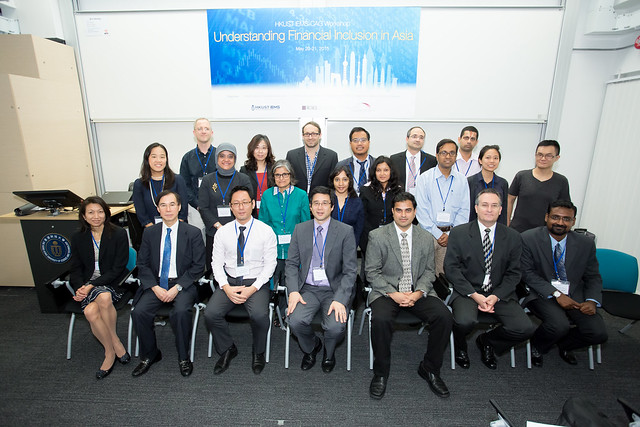Understanding Financial Inclusion in Asia – IEMS-CAG Workshop
SHARE THIS

| Tomoo Kikuchi, Ramkishen S. Rajan, Mandira Sarma, Laurent Weill, Tony Cavoli, Cyn-Young Park, Sergio Schmukler, Aaron Mehrotra, Peter Mackay, Sasidaran Gopalan, Christina Jenq, Ganga Tilakaratna, Naoyuki Yoshino, Rabin Hattari et al | |
| 20 - 21 May 2015 (Hong Kong time, GMT +8) | |
|
IAS2042, 2/F, Lo Ka Chung Building, Lee Shau Kee Campus, HKUST |
Photos
Synopsis
An integral component of financial sector development in Asia relates to the issue of financial inclusion. Several emerging market economies in the region have put in place a plethora of initiatives to expand provision of financial services to firms and households through allowing greater access to the formal credit market. While financial inclusion and financial deepening can promote economic growth and contribute significantly to denting poverty and inequality that is rampant in the region, there are also concerns that it could aggravate systemic risk and financial instability. Considering the important role played by banks in achieving financial inclusion, with bank-based financial systems dominating other forms of providers of financial services, how do foreign banks affect financial inclusion? Does financial sector openness in general and foreign bank entry in particular enhance access to finance for households and the small and medium sized enterprises? What are the regulatory constraints in achieving financial inclusion in the region? Are the technological innovations aiding financial inclusion structurally incompatible with regulations? These and related dimensions of financial inclusion will be explored in this day and a half research workshop hosted by the Institute for Emerging Market Studies (IEMS) at the Hong Kong University of Science and Technology and co-sponsored by Centre on Asia and Globalisation (CAG), at the Lee Kuan Yew School of Public Policy (LKYSPP), National University of Singapore (NUS).
The program is available here
Sessions
All available presentation slides and papers can be downloaded here.
| Session 1: Financial Inclusion: Measurement and Determinants |
| Measuring Financial Inclusion for Asian Economies Mandira Sarma, Center for Inernational Trade and Development, Jawaharlal Nehru University |
|
|
| Empirical Determinants of Financial Inclusion in Asia Laurent Weill, University of Strasbourg and Bank of Finland |
| Session 2: Financial Inclusion, Liberalization and Development |
| Financial Access, Poverty, and Income Inequality in Developing Asia Cyn-Young Park, Asian Development Bank |
|
|
| How does Foreign Bank Presence Affect financial Inclusion in Emerging and Development Economies Sasidaran Gopalan, HKUST IEMS and Ramkishen S. Rajan, SPGIA, George Mason University and LKYSPP, National University of Singapore |
| Session 3: Financial Inclusion in Emerging Asia: Country Cases |
| Financial Inclusion and Universal Health Insurance Program (JKN) Rabin Hattari, Asian Development Bank |
|
|
| Financial Inclusion in Sri Lanka Ganga Tilakaratna, Institute of Policy Studies of Sri Lanka |
| Session 4: Financial Literacy and Development in Emerging Asia |
| China's Evolving Growth Model: The Foshan Story Geng Xiao, Fung Global Institute |
|
|
| Financial Inclusion and Financial Education Naoyuki Yoshino, Asian Development Bank Institute and Keio University |
| Session 5: Financial Inclusion, Credit Constraints and Distributive Impacts |
| The Effect of Relationships with State-Owned Banks on Credit Constraints: Evidence from India Anand Srinivasan, NUS and IMMB Recording is not available
|
| Distributive Impact of TRAIL Loans in India Sujata Visaria, HKUST Recording is not available |
| Session 6: Financial Inclusion, Firm Financing and Monetary Policy |
| Capital Market Financing, Firm Growth, Firm Size Distribution Sergio Schmukler, World Bank Recording is not available
|
| Financial Inclusion and Monetary Policy Aaron Mehrotra, Bank for International Settlements (BIS) Recording is not available |
| Session 7: Models of Financial Inclusion |
| Microfinance and Financial Inclusion in India Rajesh Chakrabarti and Kaushiki Sanyal, Indian School of Business (ISB) |
|
|
| Financial Inclusion in Indonesia: Moving Towards Digital Payment System Moekti P. Soejachmoen, Mandiri Institute |
About Centre on Asia and Globalisation (CAG)
The Centre on Asia and Globalisation (CAG), at the Lee Kuan Yew School of Public Policy (LKY-SPP), National University of Singapore (NUS), is a leading research centre focused on producing quality academic research relevant to public policy. Its motto “Objective Research with Impact” reflects the Centre’s commitment to ensuring its analysis informs policy and decision makers in and about Asia. This takes place through a combination of rigorous academic inquiry, expert collaboration, high level dialogue, public outreach, strategic networks and capacity building and training. The Centre, staffed by an international team of researchers, is uniquely placed to bridge Asia and the world on issues of global significance. Its work is both inward and outward looking, concentrating on how globalisation impacts Asia and Asia’s increased role in an integrated world. Within this remit the Centre focuses on four main areas: Major power relations in the Asia-Pacific; Regional regimes in the Asia-Pacific; Public goods issues (energy, food, water and health); and New approaches to building markets in Asia. In recognition of the complex inter-relationship between levels of decision making, CAG investigates the above fields at global, regional, national and sub-national levels. It welcomes exchange with other researchers, governments, business, civil society and other stakeholders. Visit CAG web site.
Get updates from HKUST IEMS







